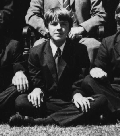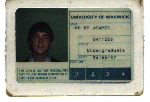From blob to boy
 Ben was born, he is assured by people who were there, in Belfast in February 1965.
Ben was born, he is assured by people who were there, in Belfast in February 1965.
Young Ben’s earliest memories are of Northern Ireland, but of his second visit there. This time the family lived in Lisburn. These memories include the day his sister arrived in this world; trying to gatecrash the headquarters of the army in Northern Ireland in his pedal car and being stopped by a grinning policeman who seemed able to guess his every move; and of seeing his father go onto a vast ship to set off on an epic sea voyage, which was probably the Belfast-Liverpool crossing.
A feature of army life is that postings come thick and fast. By the time Ben was nursery school age the family was living in Hereford, which is also where primary school started. Round about this point Ben’s father bought a house in the Cornish town of Mullion and Ben spent many happy holidays there as a boy, giving him a lifelong love of the duchy.
 Meanwhile he continued to rattle through primary schools at quick speed until at long last this mad whirl of just getting to know a place, making friends and losing them again was interrupted when his parents sent him to the unfortunately named Dumpton preparatory school, Wimborne, Dorset, which for all that much of the place was rooted in the Stone Age was also reasonably enjoyable. Looking back, Ben has seen that it was at an interesting stage similar to the Soviet Union in the closing days of perestroika, as the old ways and the new slugged it out between them with the boys caught in the middle. From the fact that Dumpton had a home page before his next school, Sherborne, Ben suspects the new ways won.
Meanwhile he continued to rattle through primary schools at quick speed until at long last this mad whirl of just getting to know a place, making friends and losing them again was interrupted when his parents sent him to the unfortunately named Dumpton preparatory school, Wimborne, Dorset, which for all that much of the place was rooted in the Stone Age was also reasonably enjoyable. Looking back, Ben has seen that it was at an interesting stage similar to the Soviet Union in the closing days of perestroika, as the old ways and the new slugged it out between them with the boys caught in the middle. From the fact that Dumpton had a home page before his next school, Sherborne, Ben suspects the new ways won.
Significant things to happen to Ben at Dumpton were: read his first Dr Who book (c. 1975), first suffered from hay fever (summer 1977) and first watched Blake’s 7 (January 1978). His parents also got the one interesting posting of his entire life, to Bangladesh. All these were to have effects on his life that still haven’t worn off (Ben believes every white, well-to-do middle class pre-teenager should be made to spend time in an impoverished Third World country). To his intense irritation his voice didn’t break until after he had left Dumpton, which meant he had to stay in the choir right until the end.
From boy to man
 At the age of 13 in the summer of 1978, with John Travolta and Olivia Newton-John wanting each other at the top of the charts, Ben passed his Common Entrance exam to Sherborne School. The initial culture shock was vast: Ben had vaguely assumed it would be like Dumpton only bigger, and not one jot of the Dumpton curriculum had been aimed at alerting its alumni to the fact that when they reached big boys’ school they would no longer be big children but young adults (a point of lingering resentment). Nor did the Common Entrance syllabus bear much resemblance to the early stages of the assault on the O-level syllabus in which Ben found himself involved. He was in a strange new place, he was out of his depth and his parents were abroad. Now he is unimpressed but then he was downright miserable.
At the age of 13 in the summer of 1978, with John Travolta and Olivia Newton-John wanting each other at the top of the charts, Ben passed his Common Entrance exam to Sherborne School. The initial culture shock was vast: Ben had vaguely assumed it would be like Dumpton only bigger, and not one jot of the Dumpton curriculum had been aimed at alerting its alumni to the fact that when they reached big boys’ school they would no longer be big children but young adults (a point of lingering resentment). Nor did the Common Entrance syllabus bear much resemblance to the early stages of the assault on the O-level syllabus in which Ben found himself involved. He was in a strange new place, he was out of his depth and his parents were abroad. Now he is unimpressed but then he was downright miserable.
However, this didn’t last and by the end of the first year he was reasonably enjoying himself. Ben was in Westcott House, the same as Alan Turing 50 years earlier, and he feels ridiculously smug at having heard of Turing long before most other people outside the maths and cryptography circles (for a start, every other Shirburnian shares this privilege: the biology block there is named after the great man). Reading Andrew Hodges’ excellent biography Alan Turing: The Enigma many years later, Ben was impressed by other similarities with Turing. Quite apart from both being conceived in India, they shared an inability to be remotely motivated by something that didn’t interest them. Sports, for a start, though Turing was a naturally much more athletic individual. Ben, being the size of a 16-year-old at the age of 13, was irritated that it was naturally assumed he would be as good as a 16-year-old when it came to rugby. At no point, even once in the 10 years of Ben’s private education, did someone sit down with him and explain why it was desirable to be good at sport; how he might have a future in sport; in what ways a sporting ability could be cultivated. Instead, Ben’s sporting ability was taken for granted, and he did what he always does when taken for granted — he went in completely the opposite direction. To this day, Ben remains in near-complete ignorance of the sporting world. Unless it’s seriously intrusive upon normal TV viewing schedules, for example Wimbledon or the Olympics, he generally doesn’t even know that some great event or other is happening. Nor is he in the least bit interested when he finds out.
Neither Turing nor Ben were rebels, they just went their own ways. Turing left the arty side of the establishment cold and wowed the maths and sciences; Ben did exactly the opposite (but possibly without the actual wowing). Turing’s housemaster is quoted in Hodges’ biography as saying he doubtless had his own furrow to plough. Ben’s housemaster said exactly the same thing.
 Before long the first distant rumbles of Career Counselling reached Ben’s ears and he fell into the clutches of Forces Brat Syndrome: although he had absolutely no desire to go into any of the armed forces, he couldn’t imagine not doing so. This syndrome is especially prevalent in children of the armed forces who go to public school, which quite irresponsibly drums in the idea that 9-5 M-F jobs are boring, you’ve got to Go Out Into the World and Do Exciting Things, and so forth. As a result of this Ben decided the RAF was the least of all evils — at least he would get to fly jets.
Before long the first distant rumbles of Career Counselling reached Ben’s ears and he fell into the clutches of Forces Brat Syndrome: although he had absolutely no desire to go into any of the armed forces, he couldn’t imagine not doing so. This syndrome is especially prevalent in children of the armed forces who go to public school, which quite irresponsibly drums in the idea that 9-5 M-F jobs are boring, you’ve got to Go Out Into the World and Do Exciting Things, and so forth. As a result of this Ben decided the RAF was the least of all evils — at least he would get to fly jets.
At the age of 16, at the end of a preliminary weekend at RAF Biggin Hill, he was told he was too tall to fly fighters: his knees would be knocked off if he had to eject. The hay fever would have made it out of the question anyway. For no good reason, other than that they wear uniform, they aren’t the Salvation Army and he doesn’t get seasick easily, he therefore tried for the Merchant Navy. A medical examination here led to the memorable exchange:
Examiner: “which direction is that ship going?”
Ben: “What ship?”
Ben thus learnt that he was short-sighted and this, coupled with various other setbacks such as the fact that he really should have registered a couple of years earlier and stuck to more scientific A-level subjects than English, Economics and History, told him that the Merchant Navy wasn’t for him either. He received this news gratefully and with a quite unnecessary bloody-mindedness — the conviction that he should go into something resembling the forces was after all in his own mind and no one else’s — decided that from now on he would plump for the future he wanted.
Other significant things to happen to Ben at Sherborne: got religion; first tentatively put pen to paper for the purposes of writing fiction (a thriller, not SF); learned to appreciate classical music.
1983 saw the return of Brigadier Lethbridge-Stewart to Dr Who, Ben’s 18th birthday and the re-election of Margaret Thatcher, the first General Election in which Ben voted. It also marked Ben’s last year at school. By this point in his life Ben was not unaware that public school might not be the best possible preparation for life in the real world and so he took a year out to see what real life had to offer.
Man plus
After a brief and unsuccessful attempt at being a Kleeneze door-to-door salesman (the nicest thing anyone said to him at this stage was that he was better than the Betaware man) Ben worked for the travel agents Trailfinders. First Ben was sent to Estepona on the Costa del Sol for a month to varnish the company’s boat: in doing so he raised the boat’s value sufficiently to pay his way as an assistant to the leader of an overland guided tour from Bangkok to Bali — the kind of package holiday plus in which Trailfinders specialises. On his return, having sampled the delights of the exotic east, Ben spent the rest of his year working in Trailfinders’ Earls Court office, then set off with his head held high and a comfortable bank balance to Warwick University to study Philosophy and Politics.
 Ben remains baffled by the number of people who, on hearing the subject of his degree course, expect him to have gone into politics. He reasons that if he had been a medical student studying venereal diseases, no one would expect him to catch one. The course did however teach him useful things such as how to think analytically and that logic does not necessarily equate with truth. He also learnt it is possible to present people with identical sets of facts and have them draw opposite conclusions: that after all is how parliamentary government works. Perhaps his most valuable lesson was the utility of having a personal faith to use as a yardstick for measuring the many different philosophies with which life presents you.
Ben remains baffled by the number of people who, on hearing the subject of his degree course, expect him to have gone into politics. He reasons that if he had been a medical student studying venereal diseases, no one would expect him to catch one. The course did however teach him useful things such as how to think analytically and that logic does not necessarily equate with truth. He also learnt it is possible to present people with identical sets of facts and have them draw opposite conclusions: that after all is how parliamentary government works. Perhaps his most valuable lesson was the utility of having a personal faith to use as a yardstick for measuring the many different philosophies with which life presents you.
Other than that, the most remarkable thing in the university experience of this Phil/Pol student is the number of Computer Scientists he knew. Mixing with their disreputable company gave him a computer literacy beyond his years, which not only gave him a useful background to the stories he went on to write but indirectly led to him working years later for a publisher specialising in information technology. It also made him confident enough to buy a word processor for his 21st birthday, and his writing took off. Other than that, Warwick was the thoroughly enjoyable three year intensive course in living in poverty, falling in and out of love and generally growing up that every degree course should be. It was here that the real world began to collide with Ben’s frothy-mouthed, glowing eyed evangelism, the two coming to blows in the supporting environment of the Student Christian Movement (a.k.a. Slightly Christian Marxists) and leading to the synthesis of Ben’s present religious convictions: a comforting middle ground guaranteed to annoy lukewarm wishy-washy liberals and proselytising evangelical zealots alike.
The employee
 Graduation led to a series of dull temp jobs doing computer input and thinking up story lines, while trying to break into the wonderful world of publishing. As it was Ben needn’t have lifted a finger: his mother’s cousin Jessica Kingsley had just started her own publishing firm, Jessica Kingsley Publishers, and she offered Ben a job. He joined as employee no. 3 in November 1987 working in the company’s offices in the Brunswick Centre, a concrete monstrosity between Russell and Brunswick Squares in London designed by a man who couldn’t decide if he was building an aviary or an Aztec city. Ben also bravely tried to live in London but a boyhood spent mostly in Cornwall and Dorset made this psychologically impossible. He therefore moved out to Cove, Farnborough and commuted into work.
Graduation led to a series of dull temp jobs doing computer input and thinking up story lines, while trying to break into the wonderful world of publishing. As it was Ben needn’t have lifted a finger: his mother’s cousin Jessica Kingsley had just started her own publishing firm, Jessica Kingsley Publishers, and she offered Ben a job. He joined as employee no. 3 in November 1987 working in the company’s offices in the Brunswick Centre, a concrete monstrosity between Russell and Brunswick Squares in London designed by a man who couldn’t decide if he was building an aviary or an Aztec city. Ben also bravely tried to live in London but a boyhood spent mostly in Cornwall and Dorset made this psychologically impossible. He therefore moved out to Cove, Farnborough and commuted into work.
He found his niche in book production, simply because this was all done on computer and Ben was the most computer literate of the staff, though he says so himself. An unfortunate incident when he should have made backups but didn’t, and the computer was stolen and several months’ worth of database records were lost, has served to make him almost obsessive about taking backups ever since. Glitches like this aside, he spent four years in the company in which he thoroughly enjoyed his work but thoroughly loathed London on a daily basis. When the loathing finally outweighed the enjoyment he sought work in more rural climes.
Learned Information was an Oxford-based company that organises conferences and publishes journals and things, all in the general realm of IT. Ben does not want to court the possibility of legal action by suggesting that the then Managing Editor was an anal control freak with a pathological inability to delegate and a compulsion to make corrections at every stage of the production process, up to and including bromides: let us just stick to the concrete facts, which are that every one of the company’s journals was at least one issue behind schedule (the most memorable was 18 months behind when Ben finally got hold of it and he literally had to blow cobwebs off the pile of manuscripts). Ben sold himself on his then largely theoretical, self-taught editorial skills and got the job as the company’s first full-time copy editor. More by default than by careful career planning he rose to be Managing Editor of the journals when it became evident to the powers that be that there needed to be someone in the office to give them love and attention. Ben started work at Learned Information in November 1991, then moved on to Isis Medical Media in 1998. His Learned Information colleagues gave him an excellent leaving card which he will treasure always.
After a six year break, Ben had to re-learn the art he had learnt with Jessica Kingsley of not giggling at his employer’s book titles. He was only glad that New Perspectives in Prostate Cancer had already gone to press when he joined: one of the first projects he had to work on was the Textbook of Male Erectile Dysfunction, a worthy tome with lots of pictures that should certainly help cure the problem in those who have it and probably induce it in those who don’t. Then there was the book on Vaginal Hysterectomy whose editor asked if the cover could have a millennial theme; Ben wasn’t quite sure what the man wanted two thousand pictures of, and didn’t want to ask.
The employer
 Even more of a giggle on the part of the great cosmic joke was that he lost this job in the first week of January 2000, which made him think at the time that he had had better centuries. The company had problems which ceased to be Ben’s concern January 7th, 2000. And by the start of the second week of January 2000, it had dawned on him that this was the opportunity to put those 12 years of academic publishing experience to some practical use.
Even more of a giggle on the part of the great cosmic joke was that he lost this job in the first week of January 2000, which made him think at the time that he had had better centuries. The company had problems which ceased to be Ben’s concern January 7th, 2000. And by the start of the second week of January 2000, it had dawned on him that this was the opportunity to put those 12 years of academic publishing experience to some practical use.
Discerning readers will have noted a fondness for science fiction in Ben’s life. As a reader, Ben had a distinct perception of the science fiction publishing industry: dominated by the same big names and themes; not at all welcoming to new voices and visions; impossible to keep a book in print for long. Why couldn’t there be a publishing company that would actively welcome new writers, and reissue older works? With low overheads it needn’t be so bottom-line obsessed as the larger, corporate publishers. At the very least it could give a book a track record: bring it to the attention of the reviewers, make it a desirable property for a bigger publisher with more money to spend.
![]() The result was Big Engine, which started publishing in 2001. Big Engine achieved a reasonable reputation in its nearly three years, publishing 11 books and 3 issues of the magazine 3SF.
The result was Big Engine, which started publishing in 2001. Big Engine achieved a reasonable reputation in its nearly three years, publishing 11 books and 3 issues of the magazine 3SF.
THE EMPLOYEE again …
Sadly the harsh realities of economics led to Big Engine’s voluntary liquidation and Ben found work as Documentation Officer with a big computer network. At this point he discovered he had really been a technical writer all along. Fed up with sitting around and twiddling his thumbs while he waited for technical experts to make a space in their busy schedules so that they could write something for him, he found it was much easier if he went and talked to the technical experts and wrote it up on their behalf. This arrangement lasted several years until the network was taken over by evil marketing drones and Ben found himself made redundant. He got a day job writing persuasive copy about magnetometers, and continued to write in his spare time, for himself and for others. Until …
And repeat
Actually there wasn’t that much persuasive copy to write about magnetometers. Maybe a couple of hundred words a month. So when a writing contract for a year’s work that paid slightly more (okay, slightly less after deducting agent’s commission) than his annual salary came along … Well, what do you think?
So, after nearly three decades of trying, Ben finally became a full-time writer. Well, for a year at least. And for someone else’s writing. Still more fun than the magnetometers. It’s now been a year and a bit. Let’s see what happens.
Meanwhile …
Ben’s ambition is to live to be 101 and 7 months, so as to reach the 1000th anniversary of the Battle of Hastings and the arrival of the man responsible for Ben’s unusual surname – a Danish mercenary called Jep, whose name features in the Domesday Book and who fought for William the Conqueror – in the British Isles. That’s what family legend says, anyway, and it’s much too good a story to bother checking. Other descendants of Jep will have to remind him what he’s staying alive for.
He is English and as quietly proud of the fact as you would expect of the descendant of a Danish mercenary who fought for a bunch of Norsemen living in northern France.
